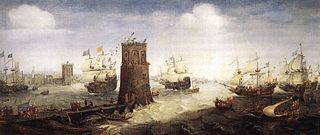Related Research Articles

The Kingdom of Jerusalem, officially known as the Latin Kingdom of Jerusalem or the Frankish Kingdom of Palestine, was a Crusader state established in the Southern Levant by Godfrey of Bouillon in 1099 after the First Crusade. The kingdom lasted nearly two hundred years, from 1099 until 1291 when its last remaining possession, Acre, was destroyed by the Mamluks. Its history is divided into two distinct periods.
Nicholas I may refer to:
Patriarch Nicholas I may refer to:

The Fifth Crusade (1217–1221) was a campaign in a series of Crusades by Western Europeans to reacquire Jerusalem and the rest of the Holy Land by first conquering Egypt, ruled by the powerful Ayyubid sultanate, led by al-Adil, brother of Saladin.

The Seventh Crusade (1248–1254) was the first of the two Crusades led by Louis IX of France. Also known as the Crusade of Louis IX to the Holy Land, it aimed to reclaim the Holy Land by attacking Egypt, the main seat of Muslim power in the Near East. The Crusade initially met with success but ended in defeat, with most of the army – including the king – captured by the Muslims.

Damietta is a port city and the capital of the Damietta Governorate in Egypt, a former bishopric and present multiple Catholic titular see. It is located at the Damietta branch, an eastern distributary of the Nile Delta, 15 kilometres (9.3 mi) from the Mediterranean Sea, about 200 kilometres (120 mi) north of Cairo.
Cyril III, known as Cyril ibn Laqlaq, was the 75th Coptic Pope and Patriarch of Alexandria.
The Battle of Fariskur was the last major battle of the Seventh Crusade. The battle was fought on 8 April 1250, between the Crusaders led by King Louis IX of France and Egyptian forces led by Turanshah of the Ayyubid dynasty.
The Crusades were a series of religious wars initiated, supported, and sometimes directed by the Latin Church in the medieval period. The best known of these Crusades are those to the Holy Land in the period between 1095 and 1291 that were intended to recover Jerusalem and its surrounding area from Islamic rule. Concurrent military activities in the Iberian Peninsula against the Moors and in northern Europe against pagan West Slavic, Baltic, and Finnic peoples also became known as crusades. Through the 15th century, other church-sanctioned crusades were fought against heretical Christian sects, against the Byzantine and Ottoman empires, to combat paganism and heresy, and for political reasons. Unsanctioned by the church, Popular Crusades of ordinary citizens were also frequent. Beginning with the First Crusade which resulted in the recovery of Jerusalem in 1099, dozens of Crusades were fought, providing a focal point of European history for centuries.

The Battle of Mansurah was fought from 8 to 11 February 1250, between Crusaders led by Louis IX, King of France, and Ayyubid forces led by Queen Shajar al-Durr, vizier Fakhr ad-Din ibn as-Shaikh, Faris ad-Din Aktai and Baibars al-Bunduqdari. It was fought in present-day Mansoura, Egypt.

The Greek OrthodoxPatriarchate of Alexandria and all Africa, also known as the Greek Orthodox Church of Alexandria, is an autocephalous patriarchate that is part of the Eastern Orthodox Church. Its seat is in Alexandria and it has canonical responsibility for the entire African continent.

Guérin de Montaigu, also known as Garin de Montaigu or Pierre Guérin de Montaigu, was a nobleman from Auvergne, who became the fourteenth Grand Master of the Knights Hospitaller, serving from 1207–1228. He succeeded the Grand Master Geoffroy le Rat after his death in 1206, and was succeeded by Bertrand de Thessy.

The Crusader invasions of Egypt (1163–1169) were a series of campaigns undertaken by the Kingdom of Jerusalem to strengthen its position in the Levant by taking advantage of the weakness of Fatimid Egypt.

The siege of Damietta occurred in 1249 and was part of the Seventh Crusade.
Patriarch Nicholas may refer to:
Patriarch Nicholas of Alexandria may refer to:

The timeline of the Kingdom of Jerusalem presents important events in the history of the Kingdom of Jerusalem—a crusader state in modern day Israel and Jordan—in chronological order. The kingdom was established during the First Crusade. Its first ruler, Godfrey of Bouillon, was not crowned king and swore fealty to the Latin Patriarch of Jerusalem, Daimbert, in 1099. Godfrey's brother and successor, Baldwin I, who did not acknowledge the patriarchs' sovereignty, was crowned the first king of Jerusalem in 1100. Baldwin I and his successors captured all towns on the Palestinian coast with the support of Pisan, Genoese and Venetian fleets and also took control of the caravan routes between Egypt and Syria. The kings regularly administered other crusader states—the Counties of Edessa and Tripoli and the Principality of Antioch—on behalf of their absent or underage rulers.
References
- ↑ Steven Runciman. The Eastern Schism. (Oxford, 1955). p. 99.
- "Nicholas I (1210–1243)". Official web site of the Greek Orthodox Patriarchate of Alexandria and All Africa. Retrieved 2011-02-07.